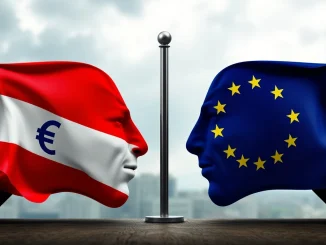
The world of cryptocurrency is constantly evolving, bringing both innovation and complex regulatory challenges. As the U.S. Securities and Exchange Commission (SEC) works to establish clear guidelines for this digital frontier, a particular situation involving a prominent political figure’s family business is casting a spotlight on the agency itself. This is where the discussion around the Trump memecoin and its implications for SEC independence begins.
The SEC and the Landscape of Crypto Regulation
The SEC plays a crucial role in overseeing the U.S. securities markets, aiming to protect investors and maintain fair and orderly markets. Under its current leadership, the agency has been actively engaged in addressing the unique aspects of cryptocurrencies. Establishing comprehensive crypto regulation is a stated priority, seeking to bring clarity and consumer protection to a space often characterized by volatility and novel financial instruments.
However, defining what constitutes a security in the crypto world, and how to regulate it effectively, has proven challenging. The SEC’s approach has been met with both praise for attempting to provide oversight and criticism for perceived delays or a lack of clarity. This ongoing process requires the agency to operate with unquestionable impartiality and a focus solely on its mandate.
The Rise of the Trump Memecoin and World Liberty Financial
Amidst this regulatory backdrop, crypto projects linked to political figures have emerged, drawing significant attention. One such project is the TRUMP memecoin, often associated with former President Donald Trump’s brand. Memecoins, by their nature, are highly speculative digital assets often driven by internet culture and community sentiment rather than underlying fundamentals.
Adding another layer is World Liberty Financial (WLFI), a crypto-aligned business reportedly connected to the Trump family. As both the TRUMP memecoin and the activities of entities like World Liberty Financial expand within the crypto ecosystem, their growing presence intersects directly with the regulatory purview of the SEC. This intersection is precisely what has ignited the current controversy.
Allegations of Political Favoritism Crypto
According to reports, including one from Forbes, the presence of these Trump-backed crypto projects has led to increased scrutiny over the SEC’s operations. Concerns have been raised, particularly by some Democratic lawmakers, about potential conflicts of interest. The core of the issue lies in the perception that a political figure’s family is involved in businesses operating within a space that the SEC is actively regulating. This has led to calls for investigations into whether this connection could influence regulatory decisions.
These allegations of political favoritism crypto related could create a difficult situation for the SEC. The agency’s effectiveness relies heavily on public trust and the perception that its decisions are based purely on legal and economic principles, free from political pressure or bias.
Threats to SEC Independence
The very foundation of a regulatory body like the SEC is its independence. It must be able to enforce rules and make decisions without undue influence from political figures, industry lobbyists, or other external pressures. The scrutiny surrounding the Trump-branded crypto projects directly challenges this principle.
If the public or market participants perceive that the SEC’s actions (or inactions) regarding certain crypto projects could be influenced by political connections, it could significantly erode confidence in the agency. Maintaining SEC independence is vital not just for fair regulation of crypto, but for the integrity of the entire financial market it oversees.
Impact on Future SEC Crypto Regulation
The controversy doesn’t just affect the perception of the SEC today; it could have tangible effects on the future trajectory of crypto regulation. Allegations of conflicts of interest and concerns about independence could potentially slow down the regulatory process. The agency might face increased political pressure, more intense public questioning, and potentially legal challenges, all of which can divert resources and attention.
Furthermore, if the agency’s impartiality is questioned, it could make it harder to build consensus around new rules or gain industry cooperation. The momentum that the SEC has been trying to build in bringing clarity to the crypto market could be weakened by the cloud of political scrutiny.
Summary: Navigating the Crossroads of Politics and Crypto
The situation highlighted by reports like the one from Forbes underscores a critical challenge at the intersection of politics, finance, and technology. The growing presence of politically connected crypto projects, such as the Trump memecoin and World Liberty Financial, is inevitably drawing regulatory attention. However, the ensuing scrutiny over potential conflicts of interest poses a significant test for the perceived and actual independence of the SEC.
Maintaining unwavering SEC independence is paramount for fair and effective crypto regulation. The allegations of political favoritism crypto related must be addressed transparently to ensure that regulatory decisions are made solely in the interest of market integrity and investor protection, regardless of who is involved. How the SEC navigates this delicate situation will likely have lasting implications for both the agency’s credibility and the future development of the crypto market.



